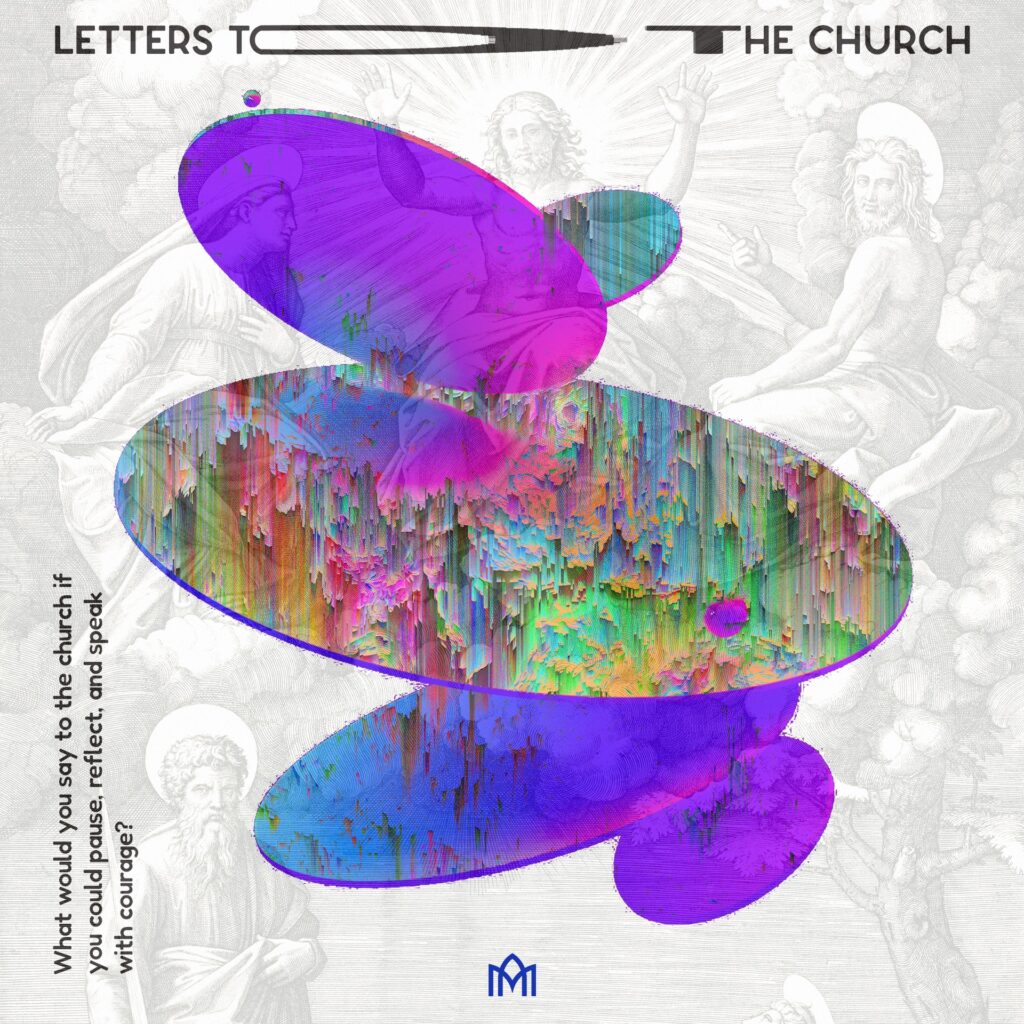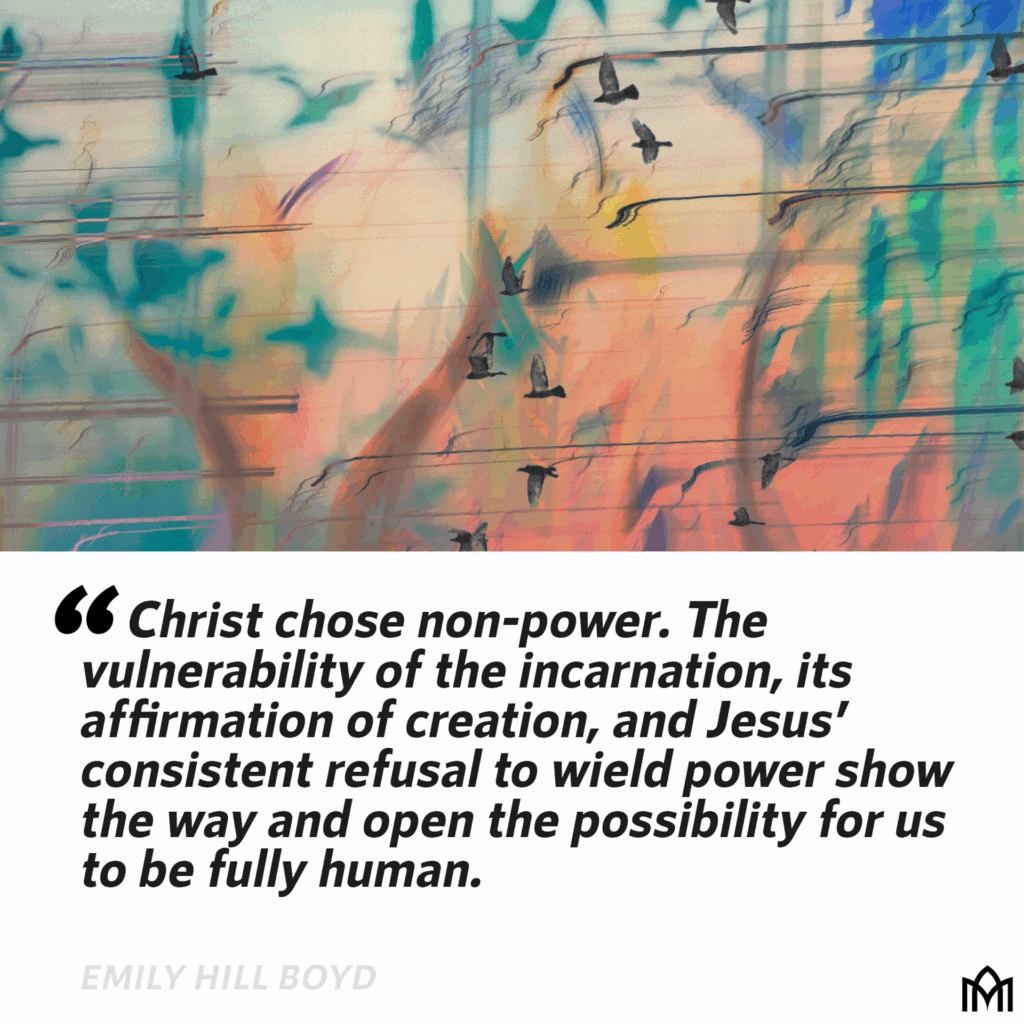A Crisis of Control: On Letting Go of Power

It’s Not Up To Us
To the Western Church, endlessly wrestling for control and power:
The other day on a road trip I was listening to a playlist a friend made for me. I typically use paid streaming services to avoid commercials, but this was on YouTube so I was subjected to a barrage of ads. I’ve spent years researching and writing about marketing from a theological perspective, yet still I was overwhelmed by the repeated message:
- Did you know you’re doing X wrong? Now that you know, you can change and get better.
- You thought you knew about Y, but it’s not working because you didn’t know Z. Now all your problems will go away.
It was like a litany being read over me: Repent! Try this, and try harder, and everything you’ve been struggling with will then fall into place.
Most of the time we ignore this message. But if we listen closely to what advertisers are telling us, we will hear this cultural message repeated as mantra, over and over again.
A Core Cultural Marketing Message
Marketers repeat this message because it’s so easy to believe. Each of us face struggles in our lives, be it our jobs, health, relationships, or the effects of broader cultural and systemic trends. It’s easy to think that once we understand the situation we can get it under control, moving on to live the lives we want. Marketers are trained to increase the number of problems we think we need to solve, simultaneously offering us the tools to get our lives back under control, all while we achieve our goals.
And yet, hearing that message amidst the busyness of daily life and our expanding awareness of suffering and systemic injustice, the message to repent and try harder feels overwhelming and frustrating, like an intense burden, always hovering above us. Face to face with endlessly complex problems, we become exhausted from our efforts, and aware of the near impossibility of solutions.
Some days I’m motivated to try one more solution; on others I just want to throw in the towel and quit. Everything seems to tell me it must be my fault for not trying hard enough.
It’s not only corporations offering us solutions. As science and technology have expanded, human beings have in fact been able to control more, to have more power, than we ever have. We genuinely believe that science offers us the means to control our destinies.
Cultural Malformation Shapes The Western Church
As church and ministry leaders, we are subject to this cultural malformation as well. The proliferation of management techniques and expertise in church leadership offers us endless methods to manage our problems—and congregants. Marketing and branding will help you turn around a declining congregation, innovation will catalyze your people, software and big data will give you knowledge about your congregation and community, and mission statements will give your church unity amidst division.
The ethical bottom line to this church approach seems to be: As long as a technique produces some kind of numerical growth, it’s deemed a good solution.
Sociologist and theologian Jacques Ellul described this as ‘the proliferation of technique.’ Ellul very early on spotted a trend that has become blatantly obvious today: Our desire to find the best approach to gain control of aspects of our daily life can quickly balloon to take over all aspects of our life. The pursuit of efficient means of control has become its own metric of success. If something succeeds according to the terms of efficiency and growth, then it must be good—no questions asked.
The tragic irony in the narrative of technological modernity is that it is precisely our belief that strategies and tools give us control over natural forces and make us free that in fact is the very belief that comes to enslave us. As Ellul concludes, “Human beings become in their turn objects of the powers they have created.”1Jacques Ellul, Presence in the Modern World, 49. We believe that we are becoming masters of our world, when ironically we’ve become defined and enslaved by our own techniques—driven to manage others and ourselves for productivity and efficiency, confused and afraid of things we cannot control.
I’ve come to realize and experience the mutually reinforcing nature of this web of techniques we rely on. As human beings force these tools on creation, we also use them on other human beings. Our imagination of the world and ourselves are largely formed by their use. Instead of living as human beings imaging God in the world, we have dominated creation and become enslaved to our own powers.
Similarly, our imagination of church and its leadership has become disfigured and anemic. Inefficient relational knowing and discernment is hard to imagine; decline is hard to accept. What does it mean to be a successful church in 2025? Will trying harder save our deteriorating institutions?
We believe that we are becoming masters of our world, when ironically we’ve become enslaved by our own techniques—driven to manage for productivity, confused and afraid of things we cannot control. Share on X
A Personal Crisis of Control
In 2021, I had an emotional breakdown. It was the middle of the Covid-19 pandemic, and I had started a new ministry and joined a church leadership team. Ministering to students online amid a racial reckoning was uncharted territory. Trying to lead and equip students from different social locations, theological traditions, and political positions was a disorienting challenge. The church leadership team I joined was thrust into a conflict amongst the pastoral staff that led to a prolonged season of mediation and peacemaking that did not go the way any of those involved would have liked.
Tensions were high, and the tightness in my chest was growing. I began having waves of panic and overwhelming emotion that eventually came spilling out, leaving me in a painful state of exhaustion and confusion, unsure of what was happening to me. I didn’t know how to move forward.
I took a break from work, determined to figure out what happened to me so I would never end up there again. But in a time of prayer I heard God say, “I’m just saying–you can take a break.” It became clear a cycle of problem solving and control largely contributed to my distress. I needed to stop entirely.
While the circumstances preceding my breakdown were certainly a catalyst, through rest, healing prayer, and counseling, I learned my anxiety manifests as trying to keep all the details of my life under control. I believe I have some natural talents for managing details, timelines and projects, and communicating well to create clear expectations in the process, but those became overdeveloped in my attempts to minimize fear, uncertainty, failure, or suffering. Whenever my capacities to control the details of my life were challenged, my brain and body could not handle it. All the difficult emotions and fear I had tried to keep at bay eventually exceeded my efforts to stay in control.
While processing this challenging reality, I experienced two deaths in my family, one of which was sudden and unexpected. Navigating anxiety and grief in this season brought me face to face with how little we can control in life. While this discovery was painful, it has ultimately been freeing. It has begun a healthy unraveling of my old ways of being in the world.
I learned that my attempts to perfectly manage details and clarify expectations will not guarantee the outcomes I desire. People will not always do what I hope or expect, and situations will not always work out the way I want. Controlling life and its endless details cannot keep me safe from failure or pain. And that’s okay.
I am safe, not because I can control all the details or won’t suffer, but because God is present to the world God has made, including me. Jesus truly does hold all things together (Colossians 1:17), identifies with our limitations and suffering, and has triumphed over the forces of death and destruction.
While it’s painful to give up the illusion of control, I’m learning that there is new life on the other side. Instead of trying to avoid the real world, which feels full of uncertainty and chaos, I try to meet God in the world as it actually is. I’m more able to embrace beauty and joy along with pain, and to let others be their full selves. I’m more able to fully love and be fully loved.
I am safe, not because I can control all the details or won’t suffer, but because God is present to the world God has made, including me. Jesus truly does hold all things together. Share on X
A Return to Creatureliness
I don’t mean to project my anxiety or experiences on to others, but the lessons I learned in this acute season of my life are applicable to many of us. While my personality and context may have created certain tendencies in me, I believe they are also a function of our enslavement to control.
At one point while I was processing through my desire to have all the details of a project in order, I realized that if I extrapolated that need out further, I would need to be God! Even if I can manage the details of one aspect of life, there is always more just beyond my grasp. If I needed to feel like things were in control to be safe, it would never happen.
Our attempts to manage and control nature, outcomes, and other people reveal our desire to be like God, rather than to accept ourselves as creatures before God. Dietrich Bonhoeffer describes the human being who has walked away from God as the source of life as “humankind-sicut-deus (humankind like God).” While this feels like freedom, it means we must create and secure life on our own terms—an impossibility that leads to “a desperate, an unquenchable, an eternal thirst.”2Dietrich Bonhoeffer, Creation and Fall, 143. Rather than finding freedom, life becomes a burden. The creation which was given by God for life becomes a scary place stalked by the threat of death.
Historically, the proliferation of methods of control began during the Enlightenment, based on a twisted view of the dominion given by God in Genesis 1:26-28. This distortion justified the exploitation of land and the domination of people. But the roots go back to the Fall—to the desire to be like God rather than creatures dependent upon God’s promises. As we turn away from God as the source of life, we must master our surroundings and create order for ourselves. And yet we cannot. As we struggle to create life on our own, we are forced to turn towards our own interests, focusing all our energy and resources on ourselves in a desperate attempt to create security in an uncertain world.
One thing salvation means, therefore, is a return to creatureliness. Through the gift of Christ, life is revealed to us again as a gift as we realize that we can trust God for every good thing. In Christ and through the Spirit, we are freed from all those things that promise life but lead to slavery.
To truly recognize God as the giver of life, from creation to redemption, is to recognize ourselves as created by God and sustained by God’s word, receiving all life and provision as a gift flowing from God’s superabundant life. Theologian Jonathan Wilson writes,
“We are not truly and fully human until we believe that we are God’s creatures and trust in Christ to remove our inhumanity, free us from all that makes us less than human, and bear away the consequences of our refusal to acknowledge our creatureliness and trust in God for life.” 3Jonathan R. Wilson, God’s Good World, 41.
Wilson continues, “To be creatures is to be cared for and sustained by life that is inexhaustible and unconquerable.”4Wilson, 40.
Techniques of control teach us that it’s up to us. Like the commercials promise: Try harder and you can fix your problems. But what those products, tools, or techniques promise they cannot ultimately deliver. They lead to death.
Friends, believe the good news of the gospel: It’s not up to us.
One thing salvation means, therefore, is a return to creatureliness. Through the gift of Christ, life is revealed to us again as a gift as we realize that we can trust God for every good thing. Share on X
On Letting Go and Being Caught by God
Something else happened to me during my breakdown. At my absolute lowest, when control was ripped from me and I could no longer work for God, God came near to me in an unmistakable way.
In the early weeks of this season, several friends encouraged me to receive healing prayer. I don’t come from a charismatic tradition, but I decided to give it a try. During one session I felt God’s presence in a dramatic way. I sensed a deep peace and relaxation come over my entire body in a way I’ve never felt before. For the next several weeks, whenever I would sit down to practice contemplative prayer I had this sensation, sometimes accompanied by words and pictures from God.
Without setting out to do so, I stumbled into a reality experienced and taught in the Christian mystical tradition. Mystics like Meister Eckhart and Johannes Tauler remind us that “in Godforsakenness our selves are found by something outside of us that saves us, with no correlation to, or impetus in, what is within us.”5Andrew Root, The Church After Innovation, 210. The Reformer Martin Luther picks up this idea in his theology of the cross, arguing that it is not in power that we find God; rather, God is found in weakness and hiddenness. As fallen human beings, we think power looks like esteem and triumph, but Jesus shows us that true glory is revealed in weakness.
Instead of “Repent! Try harder,” we need to repent and let go of control. We have to walk to the edge of the dark abyss that we’re trying to avoid by all of our own efforts and jump in. We have to confess that we are not God and allow ourselves to be creatures. This is where we find God—or more accurately, God finds us: “God gives God’s sure presence to minister directly to the self, giving to the self what the self cannot find within itself. The self is given a direct and real encounter with the true God.”6Root, 211. This path is admittedly difficult and scary, but it’s where true freedom is found. It’s where we can learn to be fully human.
In giving up control, we find the thing that we cannot possess and that we cannot control. We are freed from our slavery, pursuing the abundant life and love of the Trinitarian God.
Though I experienced this reality intensely four years ago, I have to continue to practice it and learn the lesson in my daily life, family circumstances, and ministry challenges.
A Pathway Forward For Christian Leaders
As church and ministry leaders navigating the wilderness of division and decline, the temptation to grasp techniques is powerful. This is especially true for white, Western leaders used to power and influence. We are looking for control as things feel out of control. Yet the Beatitudes remind us that God dwells among the poor and powerless. Despite how things intuitively appear, this is where God is found.
For Jacques Ellul, to be healed of our alienation and to discover a new way forward will require churches and their leaders to willingly give up the power they have. Ellul, again: “Our experience with the power of technique has led us to discover the absence of meaning…and the rediscovery of meaning is conditional upon the choice of non-power.”7Jacques Ellul, “The Power of Technique and the Ethics of Non-Power,” 246. Choosing to give up power is not the same as having none. “It is choosing not to exercise domination [and] efficiency, choosing not to rush toward success.”8Jacques Ellul, “Theology & Technique,” 242. This is the only way to take away the meaning of technique, so that “it does not have the right to judge human life.”9Ibid. More specifically, churches that have power ought to choose non-power because Christ chose non-power.10Ibid. The vulnerability of the incarnation, the affirmation of creation, and Jesus’ consistent refusal to wield power show the way and open the possibility for us to be fully human.
Here there is an opportunity to relearn the power of the gospel—not something that merely secures a future, but a power that frees us to trust Christ in the here and now. Our hope is not in a desired outcome, but in God’s promise to make a new creation. For example, rather than trying to enter a deep conflict and expecting my skills and efforts to produce a resolution (perhaps with a dose of God’s help for good measure), I can trust that God is present and working. This does not mean that I do nothing, but as I am really united with Christ by the Spirit, I can discern how I should respond, participating with the work Christ is doing in my situation. My identity and security no longer depend on how others respond, nor on a particular outcome, but flow from the gift of life God gives, acknowledging myself among God’s wonderful works.
In Scripture, the wilderness is a place where God strips the people of idolatrous institutions and habits that hold them captive; all the while, a new thing is already springing up. Christian history reveals a similar pattern. Missiologist Andrew Walls points out that as historic power centers of Christianity like Jerusalem, North Africa, or Great Britain declined, Christianity was already growing on the periphery, in new areas.11Andrew Walls, “The Expansion of Christianity,” accessed at https://www.religion-online.org/article/the-expansion-of-christianity-an-interview-with-andrew-walls/. This is where we must look, away from the decaying Western church, and toward the growing majority world church, which is flourishing!
Our strategies and techniques will not save us or our churches. Only Jesus saves. We must repent of our desire to control outcomes and our congregations. In choosing to wait for God in weakness, we open ourselves up to God’s presence, new possibilities, and wisdom for the moment.
To the Western Church, endlessly wrestling for control and power, I pray that you would live and lead:
- from the life of the Father who loves us so much he collects our tears in a bottle (Psalm 56:8),
- from the life of the Son who is our Good Shepherd in the valley of the shadow of death (Psalm 23:4), and
- from the life of the Holy Spirit who comforts, guides, and sustains us in this life, and the life that is to come (John 14:26).
Amen.
~ Emily Beth Hill
///
*Editorial Note: Letters to the Church is Missio Alliance’s newest long-form series. The latest letter to our growing collection will go live each Friday throughout the rest of 2025. We invite you to prayerfully listen to the Spirit as you read, asking God what you might say to the Church in your own voice. ~CK
“Anyone with ears to hear must listen to the Spirit and understand what God is saying to the churches.” (Revelation 2:29)
This is where we must look, away from the decaying Western church, and toward the growing majority world church, which is flourishing! Share on X




